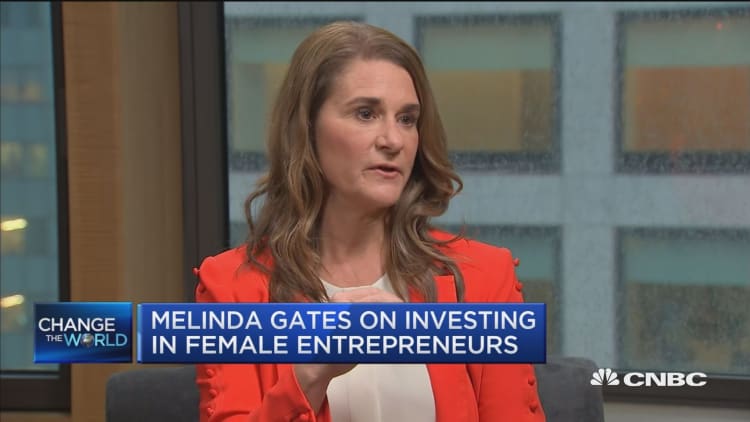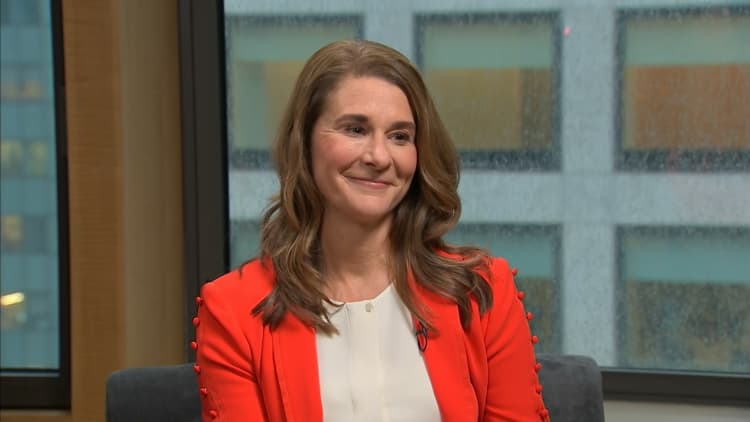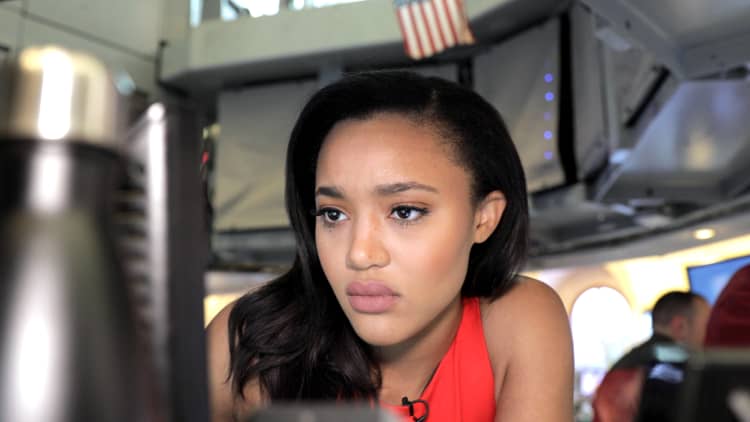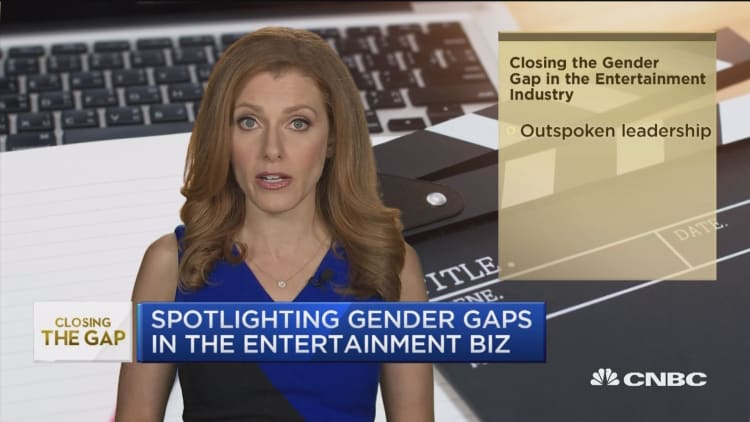In a year when Hollywood studios have been rocked by Time's Up and #MeToo allegations, men and women see persistent gender gaps in the industry. But not as many men see the discrimination and obstacles to success facing their female counterparts as women do.
In an online survey conducted last month of 1,010 men and women in entertainment, the CNBC-LinkedIn study found that reports of sexual misconduct in the workplace have raised awareness of gender discrimination and the differences in how women and men are paid, promoted and given opportunities to succeed. The poll's margin of error is 3 percentage points.
In our second industry survey of this kind, we've aimed to understand how men and women see these gaps, as well as how to close them.
'Deep unconscious bias'
Both men and women see a pay gap — but more women see it than men. Twenty-six percent of women and 52 percent of men surveyed agree with the statement, "At my company men and women working at the same level are paid the same."
When it comes to promotions, we found a similar perception gap: Thirty-six percent of women and 57 percent of men say men and women at their companies are promoted at equal rates.
Sarah Harden, CEO of Hello Sunshine, a media and production company co-founded by Reese Witherspoon, says she's not surprised by the findings.
"I think you've had immense structural bias in our companies," Harden told CNBC. "I don't think it's always intentional. I think there's deep unconscious bias." She says companies need to "shine a light on that bias, look around, and say, 'We have to do better.'"

And beyond pay and promotions, more women than men say they've observed discrimination. Thirty-five percent of women we surveyed and 23 percent of men say they've witnessed discrimination in their workplaces. The majority of women and men — 76 percent of women and 63 percent of men — believe that women feel uncomfortable reporting inappropriate behavior.
Both genders see challenges that prevent women from becoming leaders. Seventy-nine percent of women and 56 percent of men say there are obstacles that make it challenging for women to advance in the industry. That's reflected in a general pessimism about the chances for equality at the top levels: Thirty-three percent of women and 49 percent of men say men and women are equally likely to become leaders.
The head of sales and distribution at a major independent studio who is a woman in her mid-40s and has held jobs at the SVP level for 10 years tells CNBC she thinks she's been held back by a combination of factors: unconscious bias, a sense that men don't seem to feel they can speak freely with her in the room, and a lack of women in senior roles.
"Until I reached a senior level, I felt like if I worked hard I would be promoted," she said. "And then it felt like there actually is a glass ceiling."
Women in Hollywood see more obstacles than those on Wall Street
When we compared the results of this survey with our first LinkedIn and CNBC survey of financial services workers, released in June, we found that more people see gender gaps in Hollywood than on Wall Street.
In finance, fewer people we surveyed saw a pay gap: Seventy-five percent of men and 40 percent of women said workers of both sexes are paid the same. And on Wall Street, fewer people said they saw a promotion gap: Seventy-four percent of men and 37 percent of women said men and women are promoted at the same rate.
Finance workers also saw fewer obstacles to women advancing, with 37 percent of men and 59 percent of women in finance saying they saw obstacles to women's advancement, compared with more than half of men and nearly 80 percent of women who see obstacles facing women in Hollywood.
Bridging the gaps
Progress in closing the gender gap seems to hinge on corporate change. When asked about the biggest obstacle preventing women from advancing professionally, half of men and women emphasized an unsupportive or biased corporate culture. The second most popular answer? Lack of female leadership.
Giving female directors and writers more opportunities was identified by 68 percent of women and 48 percent of men as a valuable way to drive change. Meanwhile, 22 percent of women say creating more opportunities for mentorship and/or sponsorship would foster more inclusive workplaces.

Harden says that women write, direct and produce most of Hello Sunshine's offerings. The company is producing shows for HBO, Apple, Amazon, Hulu and ABC, as well as movies, a podcast, live events and an audio book partnership with Audible.
She says the company is tapping in to cultural conversations around Time's Up, as well as the power of the female consumer. "[Women] make 85 percent of purchase decisions. They drive 75 percent of financial decisions. They are 50 percent of the box office," Harden said. "When you look at … what's being made for them, there's just huge gaps."
She says Hello Sunshine's work is an example of "gaps being bridged."
More than 20 percent of both genders say it's important for recruiters and casting directors to consider talent from diverse backgrounds and perspectives. Further, a third of women and nearly a fifth of men say the number of female movie critics needs to increase, an area where we're seeing some progress. "I've seen a conscious effort to balance the playing field," the independent studio exec said.
A number of women we spoke to also questioned the entertainment industry's reliance on confidential arbitration.
"Almost every contract in the entertainment industry includes an arbitration clause, and arbitrations are always confidential," says longtime entertainment litigation attorney Kathleen Cerniglia Hipps, counsel at Greenspoon Marder LLP. "If someone thinks there's gender discrimination and it goes to arbitration, it's resolved without anyone else in the company or the public knowing about it. Arbitration clauses are meant to protect the company or employer, and don't expose companies for gender discrimination."
I think you've had immense structural bias in our companies. I don't think it's always intentional. I think there's deep unconscious bias.Sarah HardenCEO, Hello Sunshine
Cerniglia Hipps says eliminating confidential arbitration could drive change. "If companies knew that their actions would be part of the public record in a court case, they would be more cautious in their actions and less likely to engage in gender discrimination or other discrimination."
Respondents are optimistic
Our survey respondents are optimistic about corporate and individual change. In less than a year since Time's Up launched, and just over a year since #MeToo exploded on Twitter, 69 percent of men and 62 percent of women surveyed believe the movements will have a lasting effect. Over 70 percent of respondents say that in the next 10 years, the entertainment industry will shift toward more equal representation.
But Harden warns that leaders will have to adjust: "The future of their companies, I think, [is] at stake."
Young women and men are the most optimistic: Seventy-eight percent of young women and 74 percent of young men surveyed say they expect that positive change.
"The digital revolution in media has created new opportunities for women to rise, because they started at the same place as men in a new part of the industry," said an entertainment marketing executive at a tech company who has held senior roles at top digital and traditional media companies. "A lot of senior executives have been in the industry for decades and the world has changed around them. … A lot of men at senior levels haven't evolved quite yet."
She sees the biggest challenge as creating leadership opportunities for women over age 35. "You need people who are in power — and that's mostly men — to be aware of unconscious bias and to ally themselves with younger women."
Like this story? Subscribe to CNBC Make It on YouTube!
Don't miss: Meet the 20-year-old revolutionizing rock climbing for women




